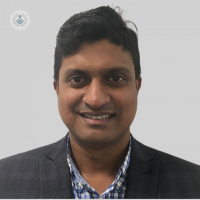PTSD: Recognising the signs and finding help
Written in association with:Experiencing a traumatic event can leave lasting emotional effects, and for some, these effects develop into post-traumatic stress disorder (PTSD). While it’s natural to feel unsettled after trauma, PTSD can bring intense and ongoing symptoms that interfere with daily life. We speak to leading consultant psychiatrist Dr Azmath Khan, who explains causes and treatment for PTSD.

What is PTSD?
Post-traumatic stress disorder, often abbreviated as PTSD, is a mental health condition that can develop after a person experiences or witnesses a highly distressing or dangerous event. These events could include combat, natural disasters, physical assaults, accidents, or any situation that the person perceives as life-threatening or severely traumatic.
It’s important to know that PTSD does not only affect people directly involved in the event but can also affect those who witness it, such as emergency responders or even family members of those affected. While PTSD is sometimes associated with soldiers and war veterans, it can happen to anyone, regardless of age, occupation, or background.
How can you recognise the symptoms of PTSD?
PTSD symptoms generally fall into four main categories: intrusive memories, avoidance, changes in thinking and mood, and changes in physical and emotional reactions. Intrusive memories can mean frequent flashbacks, disturbing dreams, or unexpected, distressing thoughts about the event. Avoidance refers to trying to steer clear of any reminders of the traumatic experience, such as people, places, or situations that could bring back painful memories.
Changes in thinking and mood can include feelings of hopelessness, memory problems, and difficulty maintaining close relationships. People with PTSD may also become emotionally numb or feel detached from others. Physical and emotional reactions might involve being easily startled, feeling constantly on edge, or experiencing irritability and angry outbursts. These symptoms can vary in intensity and may fluctuate over time, often worsening in response to specific triggers.
What causes PTSD to develop?
The exact reasons some people develop PTSD and others do not are still being studied, but certain risk factors have been identified. These include the severity of the traumatic event, prior experiences of trauma, personal or family history of mental health conditions, and the presence of additional stressors following the event. For example, loss of a loved one or job. PTSD is believed to involve changes in how the brain processes emotions and memories, especially those related to fear and stress. Specifically, the amygdala, a part of the brain that regulates emotions, becomes highly active, which may make it hard to feel safe or at ease.
Is there a way to treat PTSD?
Fortunately, there are several effective treatments available for PTSD, and most people see significant improvement with appropriate care. The two main treatment options are psychotherapy, commonly referred to as “talk therapy,” and medications. Cognitive behavioural therapy (CBT) is a popular and evidence-based form of talk therapy for PTSD. This approach helps individuals reframe negative thoughts, confront distressing memories, and learn coping mechanisms to manage anxiety.
Another treatment called eye movement desensitisation and reprocessing (EMDR) is specifically designed for trauma recovery. EMDR involves recalling traumatic events while focusing on a moving visual stimulus, which can help the brain process memories in a less distressing way. Medications, particularly antidepressants, can also support recovery by reducing anxiety and improving mood, although these are usually most effective when combined with talk therapy.
When should you seek help for PTSD?
While it’s normal to feel shaken or unsettled after a traumatic event, PTSD symptoms typically don’t ease up on their own and may even worsen over time. If you or someone close to you is experiencing persistent symptoms that interfere with daily life—such as difficulty maintaining relationships, trouble at work, or ongoing emotional distress—speaking to a mental health professional is recommended. Early intervention often leads to better outcomes, and a healthcare provider can help guide you to the best treatment options.
If you feel that PTSD may be affecting you, remember that seeking help is a sign of strength, and treatment is highly effective.
If you would like to book a consultation with Dr Khan, visit his Top Doctors profile today.


